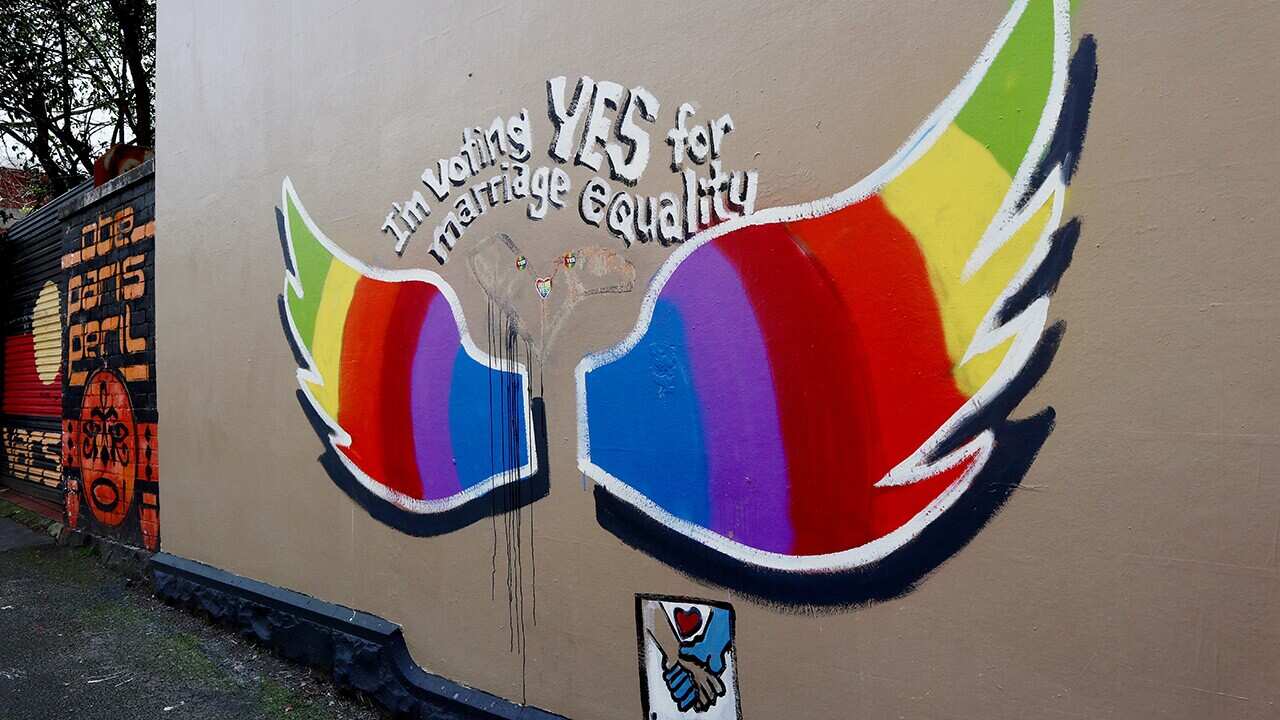Like millions of others, I received an SMS at the weekend from the “Yes” campaign for the marriage ballot. It said:
The Marriage Equality Survey forms have arrived! Help make history and vote YES for a fairer Australia.
These SMSs, which were properly authorised to which the message was linked, have become an issue in themselves, but the outrage that’s been generated is surely faux.
Acting Special Minister of State Mathias Cormann on Tuesday said his advice from the electoral commissioner was that text messages circulated so far had been consistent with the electoral requirements.
The Yes message itself could hardly have been more inoffensive. But critics say it’s unacceptable that it came on one’s mobile.
Well, mobile phones are not rare and special these days. And is it different from receiving a call to one’s landline?
In fact an SMS is less intrusive than a robocall or a call from a canvasser, which one has to answer. Let alone someone arriving at the door to campaign on this or any other issue.
Indeed I’m rather glad I got the SMS rather than mine being among the more than 100,000 doors that Yes campaigners knocked on last weekend. I don’t dispute anybody’s right to come on a mission of persuasion, but such visitors can be a pain on a Sunday morning.
The weekend Yes canvassers, incidentally, reported that most people said they’d already voted.
The claim that the SMS messages were an invasion of privacy is a huge and unwarranted stretch. The mobile numbers were generated through some random system, not obtained from a data base. If a few highly confidential numbers were by chance reached, it’s hard to see what harm was done.
Critics claim to worry about under-age people getting messages. The father of a 16-year-old was quoted as objecting. “My concern is he was only 16,” the man was . Really? It was only the other week that some 16-year-olds were clamouring for the right to vote in the ballot.
As for young children: it was a pretty harmless text – kids are seeing and hearing a lot worse on many issues.
So let’s call the complaints for what they often were – a bit of exaggerated hyperbole, pushed to generate publicity. In a campaign that is seeing some shocker claims and incidents on both sides, the SMS message blitz was certainly not one among them.
Anyway the Yes side is unlikely to be too concerned. Campaign director of the The Equality Campaign, Tim Gartrell – one-time ALP national secretary – says 20,000 people signed up to volunteer as a result of the SMS effort.
All due caution has to be applied in speculating on how this ballot is going, given its voluntary nature. But the Yes side would have to be encouraged by Tuesday’s .
After a dip last week, to 55%, in the support for a change in the law – and a fall in this week’s – Essential’s figure is now on 58%, with 33% (down one point) opposed.
More than one-third (36%) had already voted when the poll was taken in the second half of last week; 72% of those support same-sex marriage while 28% oppose.
The No case is making much of the dangers to religious freedom if the law changes. Asked “how concerned are you that allowing same-sex marriage may impact on religious freedoms?” Essential found 20% were “very concerned” and 15% “concerned”; 16% were “not very concerned”, while 42% were “not at all concerned”.
People were also asked whether over the last couple of weeks their concerns about the impact on religious freedoms had increased or decreased or stayed about the same. More than six in ten (61%) said their concerns had stayed the same; 24% said they had increased.
When we look back on this rather extraordinary campaign, it will be remembered in part for its ongoing episodes of The Abbott Family.
Tony Abbott and sister Christine are megastars for the No and Yes sides respectively. Abbott is constantly in the news. There was after he was headbutted last Thursday by a man with a “Yes” badge, who later said the marriage issue did not figure in his motives.
Christine lets her brother get away with nothing; she is quick out of the blocks with tweets to respond to his various comments.
Now another Abbott is on the stage. A has been released with Abbott’s daughter Frances promoting the Yes case.
After Frances posted a in a “vote yes” T-shirt, the Yes campaign, which is specialising in “human stories” and closely monitors social media for leads, reached out to her to become more involved. She was keen to do the video, in which she says she wants to see “Aunty Chris” able to get married. Frances’ story was soon running on .
She was keen to do the video, in which she says she wants to see “Aunty Chris” able to get married. Frances’ story was soon running on .


